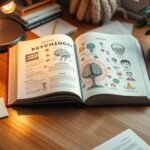

Living with loss is a part of being human. It brings deep sadness but also a chance for self-discovery. We learn about resilience and coping with grief. Facing these emotional challenges helps us find true authenticity and purpose.
Grief teaches us wisdom, compassion, and the value of relationships. It shows how precious life is. Despite its pain, loss can lead to significant growth, revealing our inner strength and healing abilities.
“Discovering Psychology 9th Edition Susan Nolan” gives insight into loss’s effects, suggesting ways to cope. PSY 100 Introduction to Psychology offers personalized support in dealing with complex emotions1.
Table of Contents
ToggleKey Takeaways
- Loss presents an opportunity for profound self-discovery.
- Grief and loss can lead to psychological resilience and growth.
- Openness in facing grief can enhance wisdom and compassion.
- Educational resources like psychology courses can support coping with grief.
- Understanding grief helps in forming deeper, more meaningful relationships.
The Emotional Journey of Grief and Loss
The journey through grief is unique and often complex. Many finding their way through it face sorrow and pain. Stories from those who’ve suffered loss show that accepting sadness is key to healing. Research highlights that many dealing with mental health have experienced trauma2. Recognizing and addressing this pain is vital for recovery and self-growth.
The mental health system is becoming more aware and active. Public knowledge and better service access have contributed to this2. New trauma recovery approaches for men and women are in place. These models, along with ones for children, help people deal with grief effectively2.
Culture plays a big role in the success of trauma recovery. Programs that respect cultural differences work better2. Early trauma affects how people parent, needing specific support. Also, treatments for PTSD and severe mental health issues are proving to work well2.
The book “Discovering Psychology 9th Edition Susan Nolan” sheds light on the psychology of grief. It covers topics like trauma, sadness, and how different cultures grieve3. It discusses grief from various angles, including war and the Holocaust. This helps us better understand the journey of loss3.
Grief programs for kids and families are making a big difference. They show it’s important to look at grief fully2. Group help for those with mental health and addiction issues is also impactful. Being in a supportive community helps people deal with their pain and grow from it2.
Understanding the Psychological Impact of Loss
Loss can change us deeply, altering how we feel inside. It’s key to understand the stages of grief and how it affects us during bereavement. We’ll look into these stages and how to handle grief recovery.
The Stages of Grief
Elisabeth Kübler-Ross identified five grief stages: denial, anger, bargaining, depression, and acceptance. These stages are not the same for everyone. They can change in how strong they are and how long they last. The way we lose something can deeply affect our emotions. It can make us question who we are and our place in the world.
A study showed first-generation immigrants felt less depressed than native-born youths. They also reported more positive feelings4. This shows that where we come from can affect how we deal with loss.
Coping Mechanisms
Having ways to deal with grief recovery is important. It helps us find our way back to normal life. People use different strategies to cope:
- Journaling: Writing down what you feel can help you process your emotions and thoughts.
- Therapy: Getting help from a therapist can give you personalized tips and support.
- Social Support: Connecting with others who understand what you’re going through can provide comfort and peace.
- Spirituality: Finding strength in spiritual beliefs was especially helpful for African American teens dealing with stress and loss4.
- Meditation and Mindfulness: These practices can keep you present and help control strong feelings.
Remember, getting over bereavement is a unique path for each person. Different types of support, from professional help to community ties, are key in grief recovery.
Embracing Loss as a Part of Life
Accepting loss as a natural part of life helps us grow deeply. It teaches us to intertwine grief into our stories, leading to resilience. The book “Living through Loss: Interventions Across the Life Span” offers insight5. It explores grief at every stage of life, touching on divorce, illness, and death5.
Today’s world reveals how common grief is, with losses from COVID-19, climate change, and social injustice5. Understanding these losses is vital for our global knowledge5.

The book “Right Kind of Wrong” is also a great guide on handling loss6. It won the 2023 Financial Times & Schroders Business Book Award and was praised by Thinkers506. It shows that accepting setbacks is key to growing personally and professionally.
Loss teaches us valuable lessons. Dealing with it openly helps us accept and grow5. We learn from events like family deaths, understanding our stories better5.
Seeing loss as a journey transforms us. The lessons from “Living through Loss” and “Right Kind of Wrong” change how we view setbacks. They show the importance of loss in our evolution56.
Befriending Loss to Find Meaning
Experiencing deep loss often plunges us into darkness. Yet, this darkness hides a chance for profound change. By embracing loss, we can work through our grief. We can find new depths of empathy and strength. This section shows how painful experiences can spark growth.
Transforming Pain into Growth
Life throws tough challenges our way, especially with big losses. These moments call for strong emotional reactions. Yet, it’s these reactions that open doors to growth. For instance, Bayard Rustin showed incredible bravery when arrested on a bus, 13 years before Rosa Parks did7. His bus rides across the South, 14 years before the Freedom Riders, show how hardships can inspire great deeds7. Facing grief and challenges head-on can transform us. We find deeper meaning and a stronger purpose in life.
Developing Resilience and Empathy
Grief doesn’t follow a straight path. It teaches us resilience and empathy. Bayard Rustin’s work to organize the 1963 March on Washington showed his incredible resilience against huge obstacles7. Similarly, in Lin Anderson’s eAudiobooks, forensic scientist Rhona MacLeod shows the toughness needed to face adversities and seek justice8.
By accepting and learning from loss, we not only grow stronger emotionally. We also develop a deeper compassion for others’ battles. This journey of resilience and empathy helps us understand ourselves and the world better.
| Key Concept | Example |
|---|---|
| Resilience | Rustin’s March on Washington organization amidst challenges7. |
| Empathy | Forensic scientist Rhona MacLeod’s pursuit of justice despite adversity8. |
| Personal Transformation | Bayard Rustin’s integrated bus rides and arrest before Rosa Parks7. |
| Growth Through Pain | Julia Baird’s emphasis on awe and wonder in “Phosphorescence”8. |
The Role of “Discovering Psychology 9th Edition Susan Nolan” in Self-Discovery
Finding oneself after a big loss often needs support and insights from psychology. The book “Discovering Psychology 9th Edition Susan Nolan” gives valuable views from cognitive science and developmental psychology.
The book talks about how cognitive science helps widows understand their grief better. Cognitive science focuses on how we think and feel after losing someone. It offers ways to think differently about our feelings and thoughts after loss. This helps in building a new self and a future with purpose. Being part of a supportive group also helps widows. It lets them make new friends and supports their healing and discovery journey9.
Insights from Cognitive Science
Cognitive science gives amazing viewpoints on how we deal with grief and changing identities. It helps us understand how we make and remake thoughts and memories after trauma. Knowing this helps widows see things differently and grab new chances. It also helps with dealing with other big losses, like losing one’s identity and future dreams9.
Practical Applications of Developmental Psychology
Developmental psychology is key in how we change and grow through different stages of life. “Discovering Psychology 9th Edition Susan Nolan” highlights how to manage the emotional chaos of loss. Activities like writing in a journal, meeting with friends, and trying new hobbies help. These things help widows figure out their new goals and find what they’re passionate about10. These steps are crucial for finding a new purpose and community, which are important for healing and growing personally9.
The book encourages widows to dive into personal growth activities. Things like going to social events or therapy help in dealing with grief in a healthy way. For more on how widows can find new purpose, check out insights here. By using these educational resources, people can live a life full of fulfillment and power after grief.
Utilizing Educational Resources for Personal Growth
“Discovering Psychology 9th Edition Susan Nolan” helps greatly in personal growth and learning about ourselves. You can find it in digital or print, fitting how you like to learn11. It dives deep into human behavior, crucial for psychology. By using it, psychology students get a deeper look into mental health11.
This term, there’s a wealth of online materials on psychology, anthropology, and more12. Courses like “Introduction to Psychology” are in small groups for the best learning1.
The introductory psychology videos offer over 120 clips on current topics11. They make the textbook more relatable with real-life examples.
“The ability to understand and apply psychological principles through well-structured educational resources and online learning materials is invaluable for personal development and professional growth.”
Students can dive into health psychology, cognitive psychology, using online materials and curriculum1. Tools like Achieve help by mixing assessments and activities into teaching11.

Courses on medical and forensic anthropology broaden students’ learning12. With these resources, psychology students can tackle complex behaviors and make a difference in their fields.
The Power of Empathy in Healing
Empathy is key in healing, helping us bond during tough times. It allows us to connect and share our stories. This way, we understand and support each other better. Having empathy is vital to create lasting and meaningful connections that improve our lives.
Building Meaningful Relationships
Emphasizing empathy helps us form deep connections. These relationships enable us to offer mutual support. In 2004, Barack Obama talked about America’s “empathy deficit.” He stressed how empathy is crucial for healing together and individually13. Empathy’s value is recognized in psychology, social science, and neuroscience. It plays a big role in bringing people together13.
Connecting with Others Who Understand Loss
It’s healing to connect with people who have faced similar losses. Being part of groups that encourage sharing can create strong bonds. You feel like you belong. A workshop titled “Varieties of Empathy in History, Science, and Culture” showed empathy’s wide impact. It highlights how empathy aids in dealing with grief13. The Comprehensive Law Movement integrates legal processes with empathy. It aims to help people overcome challenges through restorative justice and transformative mediation14.
Rediscovering Identity After Loss
The journey of rediscovering identity can be tough, especially after a big loss. Many people find themselves in an identity crisis, unsure of who they are without their grief. Yet, this time can also bring growth and a new understanding of self.
People share stories of finding themselves again, showing how hard it is to start over. They explore different beliefs, like Eastern religions, New Age ideas, or even the use of hallucinogens, to find a new sense of who they are. These paths, though unique, show how people search for meaning15.
The path to finding oneself often includes embracing change and finding a new life purpose. Some find inspiration in science fiction, with ideas of space travel, galactic empires, and transhumanism. These concepts offer a way to think about new identities and possibilities15.
Despite seeming contradictions, many find meaning in old stories like Noah’s Ark. These stories offer comfort and a sense of identity15. Creating and believing in a new personal story can be key to healing and finding oneself again.
Also, the mix of fantasy and reality in science fiction shows how imagination helps in self-discovery. This combination can give hope and direction while rediscovering oneself15.
Rediscovering identity after loss involves exploring beliefs, imagination, and beginning anew with a stronger self. By looking into personal stories and cultural trends, we understand how people overcome their identity crises. They emerge stronger and more fulfilled.
Finding Purpose Through Community Support
After losing someone, finding purpose again can be easier with community support. Joining support groups and online forums lets people connect and share stories. This way, they feel stronger together. These places are not just for comfort. They also help people grow and learn together.
Support Groups and Online Forums
Support groups and online forums are really important. They give people a safe space to talk about their grief. Here, people understand each other’s pain. They share their stories, building empathy and making everyone feel less alone. Online forums reach across the world, connecting different cultures.
An Editorial Fox article talked about how online communities help those dealing with loss. They let people share feelings and learn from others in similar situations11.
Volunteering and Helping Others
Volunteering is another great way to find purpose after loss. Helping others can give new meaning to your life. It can turn your own loss into motivation for making a difference. Volunteering makes you feel proud. It also brings people closer and spreads kindness.
Studies show that volunteering makes people feel more connected and happy16. You could help at shelters, clean up your community, or use your skills to help someone. Every bit of volunteering knits a stronger community bond.
A quick look at the benefits of support groups, online forums, and volunteering shows:
| Aspect | Support Groups | Online Forums | Volunteering |
|---|---|---|---|
| Reach | Local | Global | Local/Global |
| Accessibility | Scheduled Meetings | 24/7 Access | Flexible Schedule |
| Emotional Support | High | High | Moderate to High |
| Personal Growth | Consistent Progress | Ongoing Insight | Hands-on Development |
| Community Integration | Strong Local Bonds | Diverse Connections | Building New Relationships |
Community support through these methods greatly helps in self-discovery. It turns grief into chances for growth and meeting others. Whether it’s through support groups, online communities, or volunteering, helping others and feeling supported helps individuals regain their purpose and find new joy in life.
Personal Stories of Transformation
In the journey of grieving, many share stories that are powerful and inspiring. These stories start with deep loss but grow into tales of new purpose. By joining community support groups, sharing their pain helps people grow.
One standout story is from people using digital platforms like MicroMedex and DynaMed. Even though these are mostly medical sites, they motivated users to find deeper meanings in their struggles17. In the same way, Embase® by Elsevier, due to its broad range of pharmaceutical literature, has encouraged a new way of thinking, offering a new outlook on life17.
Amid these stories, many have found a new purpose. Tapping into resources like Lane Medical Library and Cochrane reviews helped them use information for personal growth17. This turned their grief into a chance for change, reshaping their lives and encouraging others.
These stories show the true meaning of living beyond grief. They teach us how personal stories can shine as a light of hope. As more tales of transformation come alive, they showcase our ability to overcome tough times. These stories reveal our deep capacity for finding ourselves amidst adversity.
Conclusion
As our journey ends, we see that dealing with loss brings more than sadness. It opens doors to deeply knowing ourselves. Through grief, we can grow and change in great ways. Learning to be resilient helps us come out stronger and more understanding.
The book “Discovering Psychology, 9th Edition” and similar works teach us something important. They show how our reactions to loss are connected to our minds and how we grow. By putting in over 100 hours of study, we learn to handle loss18. This effort leads to lasting joy, even when times are tough.
Getting close to those who support us matters a lot during tough times. A discount on books like “Discovering Psychology” makes getting help a bit easier. It shows we’re not alone in this19. Making friends and using easy-to-get resources can help us deal with loss. We find new reasons to be happy and move forward in life.
FAQ
How can experiencing loss lead to self-discovery?
Going through loss can lead to deep personal growth. It makes you live a life true to yourself and builds inner strength. You also start valuing your relationships and life more.
What are the typical emotional stages one goes through when dealing with grief?
Grieving involves stages like denial, anger, bargaining, depression, and acceptance. Understanding these feelings is key to healing and growing.
How does understanding the stages of grief help in coping with loss?
Knowing the grief stages shows that your feelings are normal. This comfort, along with support like therapy, helps you through the sorrow.
Why is it important to embrace loss as a part of life?
Accepting loss as part of life helps weave your sorrow into your life story. This attitude promotes acceptance, growth, and toughness.
How can one transform pain into personal growth?
Transforming pain into growth means facing sorrow head-on, letting it spark change. This leads to self-understanding, resilience, and greater empathy.
What insights does “Discovering Psychology 9th Edition Susan Nolan” offer for self-discovery post-loss?
“Discovering Psychology 9th Edition Susan Nolan” offers insights from psychology to aid self-discovery after loss. It provides theories and applications to tackle life’s hurdles.
How can educational resources aid in personal growth after loss?
Educational tools, like “Discovering Psychology 9th Edition Susan Nolan,” deepen insight into human thought and mental health. They are vital for growth and resilience.
What role does empathy play in healing from grief?
Empathy is vital for healing, as it helps build deep, understanding connections. Being with others who have also experienced loss is key to emotional healing.
How can one rediscover their identity after experiencing significant loss?
After a loss, redefining oneself involves overcoming an identity crisis. It opens doors to new beginnings, filled with meaning and happiness.
How can community support aid in finding a new purpose after loss?
Engaging with community through groups, online forums, and volunteering, aids self-discovery. It offers a sense of belonging and shared goals.
Are there examples of individuals who have turned grief into transformation?
Many have turned their grief into a force for major change. Their stories inspire a fresh start and a passionate approach to life.

As a trusted news source, Editorial Fox prides itself on upholding the highest standards of journalistic integrity. Our commitment to accuracy and fairness ensures that our readers can rely on us for reliable information.
Contact: editorial@rcopa.com
About Editorial Fox
At Editorial Fox, we are committed to delivering high-quality journalism that informs and engages our readers. Our team of experienced journalists and editors work tirelessly to bring you the latest news and analysis from around the world.
Copyright @2024 Editorialfox.com All Right Reserve.


Be the first to leave a comment